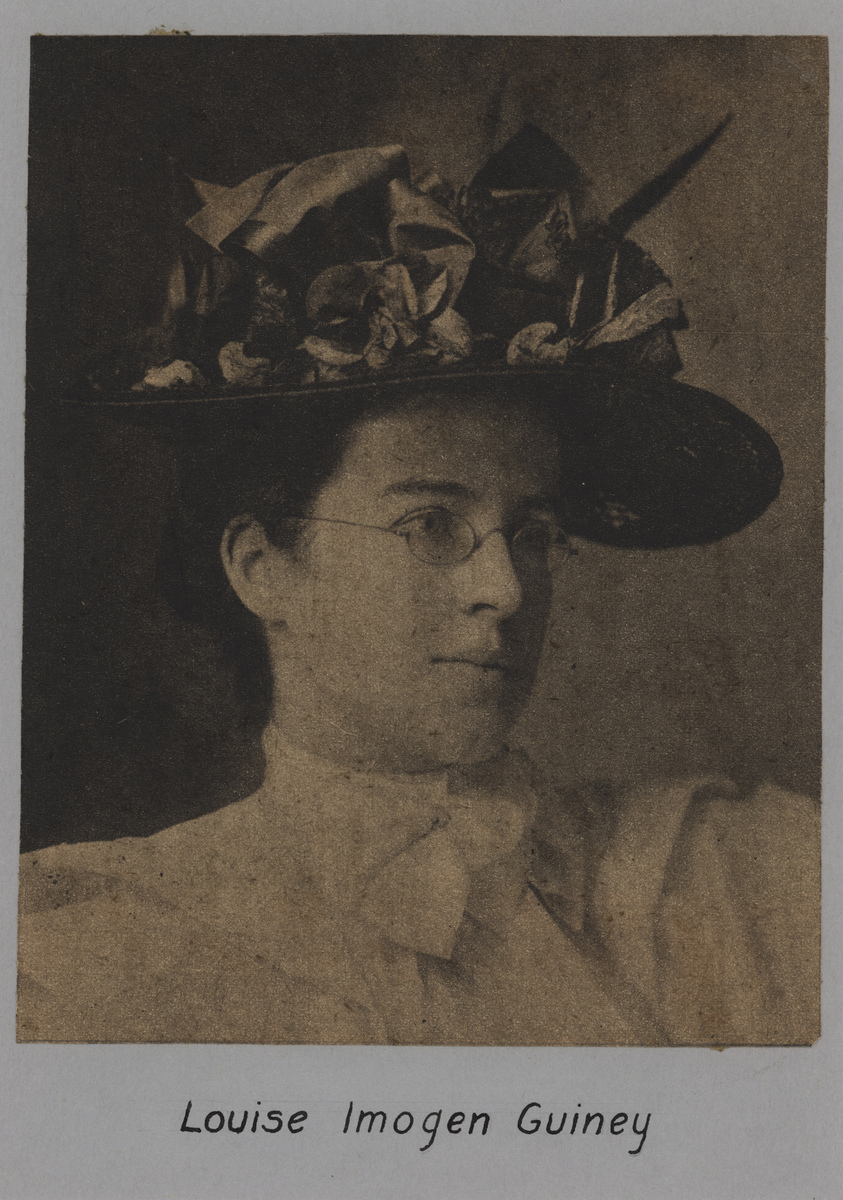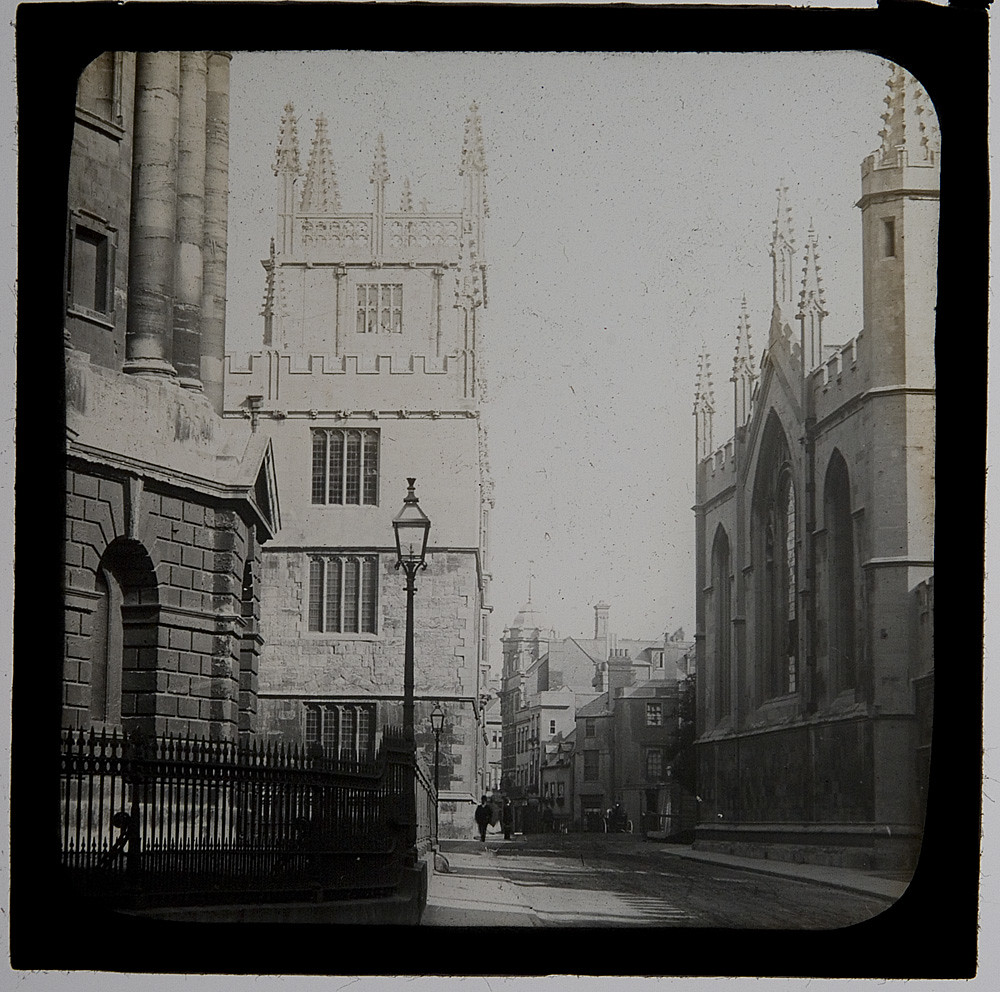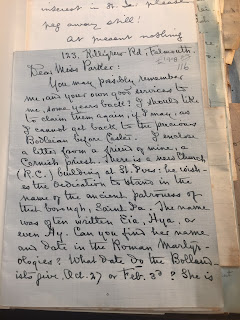This is the sixth in a series of posts about my Humfrey Wanley
Fellowship project, which investigates the scholarship of the women who staffed the Bodleian's unofficial research department in the early twentieth century. The full series of posts can be read here. The first post, which outlines the scope and background of the project, is here.
...a little lunch-party with,
she gathered, some kind of historical basis, mention of somebody's
article for the Proceedings of Something or Other, which Wimsey
was going to 'step into All Souls and look at--it won't take you
ten minutes,' and references to the printing and distribution of
Reformation polemical pamphlets--to Wimsey's expert knowledge--to the
other man's expert knowledge--and to the inexpert pretence at knowledge
of some historian from another university. ~ Dorothy Sayers, Gaudy Night
One of the unexpected delights of reading the letters to the Parker family found in the Bodleian's Library Records collection is glimpses of their correspondents' daily lives and personalities: the countess who got to the post office and realised she'd forgotten her purse; a vicar driven to distraction by a kitchen boiler catastrophe; an absent-minded academic who stuck a cheque in his pocket and forgot to send it for a few weeks, an antiquarian whose scholarship came to a screeching halt when his son fell ill and needed to be home-schooled for a few months. Overwhelmingly, the letters are to members of the Parker family, not from them, which means that their own personalities and domestic lives largely take shape as negative space.
Of course, the point of my project is to look at their expertise and involvement in scholarship, not their personal lives; but it is interesting when the two intersect, as they do in the following letter to Angelina Frances New (née Parker) (1865-1939).
 |
J. Maitland Thomson to Angelina F New, 11 November 1905; Library Records d. 405. Photo: Hope Williard, Courtesy of Bodleian Libraries
|
3 Governor Gardens, Edinburgh
11 November 1905
I hasten to offer you my congratulations and to assure you that if I had been au courant of Oxford news, I would not have troubled you with business at such a time.
I gather that you intend to finish what you have undertake me, quand même. When you are writing any way, I should be obliged if you could mention whether you intend to continue Record-searching. I want nothing more at present, but I never can tell when something may be required, and I may at any time be asked to recommend someone for work of this kind.
The 'Oxford news' in question was that Angelina Parker had gotten married to Randal Herbert New, a printer nineteen years her junior, who was born in Brazil to English parents. Evidently, the new Mrs New did not intend to let her marriage interrupt a commission in progress, and her correspondent, John Maitland Thomson, Curator of the Historical Department at the Scottish Records Office, found her expertise valuable enough to inquire about her long-term plans.
The library records letters show that experts who could reliably collate, date, transcribe, and translate medieval documents were invaluable to scholars who could not come to the Bodleian to do work themselves--a number of the Parker family's correspondents indicate that their services came highly recommended by others who had used their work. Thomson's question about her long-term plans provides a wonderful testament to this network of recommendation, and also a useful corrective to the assumption that Edwardian women stopped working after marriage.
Their correspondence, which began in July 1905, provides further testament to networks of recommendation. In his first letter to Angelina Parker Thomson mentions that she was recommended by a Miss E.M. Thompson, who did record-searching on his behalf in London. The letter is worth quoting in full to give an accurate sense of Thomson's work with Thompson, and of the ambitious scope of his initial inquiry.
 |
Letter from J. Maitland Thomson to Angelina Parker, 15 July 1905. Library Records d. 405. Photo: Hope Williard, Courtesy of Bodleian Libraries.
|
15 July 1905
Dear Madam,
Some time ago I asked Miss E.M. Thompson, who kindly does for me much Record-searching as I require in London, to give me the name of some one who would undertake similar work in Oxford. Miss Thompson in reply sent me your name and address: so I now write to ask you if you are willing to undertake searching for me.
Of course, I would be glad to hear of any Ms. worth going over (from my point of view) in any of the Libraries but assume that the Bodleian is the likeliest to yield good results.
I am endeavouring to form a Calendar, as complete as I can achieve, of all Charters and writs of the early Kings of Scotland, down to 1424, to form part of a forthcoming Scottish Record publication. You are doubtless aware that on King David I, Malcolm IV, and William the Lion were English nobles as well as Kings in their own country, and in that capacity made many grants, of which those to Religious Houses are often preserved--Miss Thompson has found me a good many such, besides what is printed in the Monasticon and elsewhere. Probably the Bodleian contains reprints of which these is no copy in the British Museum, and there may be other Mss in other Oxford libraries.
The Chartulary of St Frideswide's is in print, so there is no need to trouble with it, I have procured photographs of the only two ancient Scottish Charters which appear in the Bodleian Calendar, and the Librarian of Madgalen College has kindly communicated to me full notes as to the Scottish Charters there preserved, beyond that anything from Oxford would be new to me.
The first thing to do is to obtain if possible a list of the Chartularies found at Oxford, and then decide what is worth going on in detail. The likeliest Chartularies are those of the Midland Counties, from ?shire to ?shire and as far north as Northamptonshire etc, ?shire, also, then of the Downs Counties.
What I want copies of are--all you can find of the Kings of Scotland and (which I am about now) Scottish earls of Huntingdon and Northampton; also charters relating to important Scottish families--of which ? a note should suffice, but I am specifically interested in the Olifards, and the Hays-- as to the four I want the fullest details I can get.
A secondary source that might be worth exploring after the ancient Mss, is the collections by old antiquarians in which the Bodleian is rich.
I hope I have made my wants sufficiently intelligible and that you are willing to try to supply them, I presume your terms will be similar to Miss Thompson's but it might be convenient to put them on paper for me.
Apologies for troubling you, I remain, dear Madam, Yrs faithfully,
J. Maitland Thomson
Address--Historical Department, General Register House, Edinburgh. Just to say that I prefer to have the contractions unextended.
Delightfully, the connection between Oxford and London transcribers is fleshed out by further letters--Library Records d. 409 contain five letters from Miss Thompson, largely about manuscript transcription, dating from 1910. Although only one of the letters is to Mrs New--the rest are to her sister, Evaline--they provide some evidence that not only did Angelina New intend to keep working, she was actually able to do so to some extent.
Returning to the period immediately following her marriage--less than a week after Thomson asked Mrs New if she intended to continue her work, their correspondence on scholarly matters picked up pace.
16 November 1905
Dear Madam,
I enclose cheque for £5 to account as requested; and am very glad to have the first installment of the Brachley Charters. I will look them over when I can get time, and will ask you anything that puzzles me. I have by me copies of the short extracts by Mr Macray.
Would the Bodleian be willing to photograph certain of the documents? I have got them to photograph two charters of their own some time ago. But I know they draw the line and will not compete with the trade in miscellaneous work, what I want are 1) the agreement between Brackley and Inchaffray about certain teloids (tithes I mean--I apologise). It is Brackley D. 126. 2) Such of the seals as seem worth doing--I believe the Bodleian method of reproducing seals is particularly successful. If they are willing, I will write particulars later on. Meanwhile you might give me the size of the document I have indicated.
Yrs faithfully,
J. Maitland Thomson
What exactly was Thomson working on? His first letter (of July 1905) explained that he working on a Scottish Records
publication of Scottish royal charters and wanted help finding sources
in the Bodleian. Letters over subsequent months make it clear that the
search was also extended to the collections of various Oxford colleges. While this work never seems to have been fully published, later editors of Scottish royal charters noted the importance of Thomson's groundwork.
As a testament to the range of his scholarship, Thomson was editor The Register of the Great Seal of Scotland from
1884; but Angelina Parker New does not seem to have contributed Oxford material to this.
However, her work did contribute to Thomson's edition of Scottish monastic charters, Charters, bulls and other documents relating to the abbey of Inchaffray, chiefly from the originals in the charter chest of the Earl of Kinnoull, published in 1908. The
final letter from Thomson in the Library Records collection, from 1906, relates to work for this edition.
 |
J. Maitland Thomson to Mrs New, 27 November 1906. Library Records d. 405. Photo: Hope Williard, Courtesy of Bodleian Libraries.
|
27 November 1906
I have received the Bursar's [of Magdalen College, where Mrs New transcribed a charter in 1905] permission and have enclosed it to the Bodleian Librarian asking his leave also.
I have also written to the University Press, explaining that you will point out the document and seals. Also I have said that the charter of Roger de Quincy (C. 127) is to be life size but the Agreement (D. 126) to be in your discretion either the size to go into the octavo page (9 x 5-1/2) or a 10 x 8 plate and to fold. The seals all full size and absolutely exact.
Yrs faithfully,
J. Maitland Thomson
Mrs New's contribution is acknowledged in a footnote in the edition:
From a copy, made about 1350, at Magdalen College, Oxford; marked
Brackley D 116. Transcribed by Mrs. New of Oxford. Some parts being injured, the MS. has been carefully examined, and the words or letters which
appear to be missing supplied within brackets. A piece of parchment sewed on
contains copies in the same handwriting of the two charters here appended. (p. 155).
What's particularly interesting about this footnote is that it makes clear the degree of skill manuscript transcription required--medieval handwriting is often extremely difficult to read. It can be heavily abbreviated, or, as was the case here--damaged, making a knowledgeable interpreter crucial in understanding what a text actually says.
The letters between Angelina Parker New and J. Maitland Thomson provide an excellent example of the ways in which the transcribers, translators, and copyists of the Bodleian's unofficial research department might be involved at different stages of a scholarly project, from the initial search for sources to final publication. They illustrate the collaborative means by which early twentieth century editions were created, in which the expert
knowledge of transcribers such as E.M. Thompson and Angelina Parker New played a key role.
Further Reading
H. A. Cronne, “Early Scottish Charters.” The Scottish Historical Review, vol. 40, no. 130 (1960): 146–51.
William Alexander Lindsay, John Dowden, and J. Maitland Thomson. Charters,
Bulls and Other Documents Relating to the Abbey of Inchaffray, Chiefly
from the Originals in the Charter Chest of the Earl of Kinnoull (Edinburgh, 1908).
George Neilson, “Sir Archibald Lawrie’s Charter Collections.” The Scottish Historical Review, vol. 19, no. 76 (1922): 241–53.











